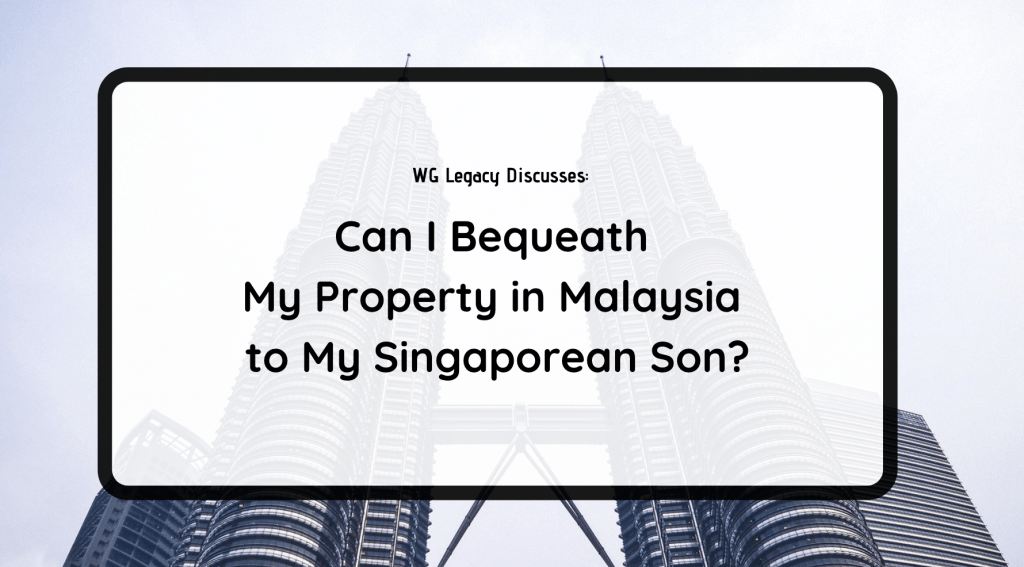Question:
Hi, my name is Lee. I have been living in a freehold landed house in Subang Jaya which is now worth RM 850,000. I have a son, Leon who has recently renounced his Malaysian citizenship and becomes a Singaporean. Hence, my question is, ‘Is it possible for Leon to inherit my property in Subang Jaya?’
Answer:
The answer is yes.
A foreigner is able to own and inherit a property in Malaysia under the National Land Code only after he has obtained the approval from the state government.
But the question is this:
Can Leon buy a new HDB flat after inheriting the property from his father?
The answer is yes.
According to the HDB, Leon and his spouse or his fiance (the essential occupier) must not own, dispose or have an interest in any other property in Singapore or overseas within 30 months before the date of application of a new HDB flat and up to the date of taking possession of the new flat.
However, the HDB has listed a handful of exemptions to the above rule and one of them is for properties owned as a result of being a beneficiary under a will. If that is the case for Leon, he will need to first fill in a property questionnaire and submit it to the HDB for review.
With that being said, in this article, I’ll highlight a couple of things that both Lee and Leon should consider beforehand so that their interest can be taken care of efficiently. The key question to be answered is:
a. Does Leon want to keep his father’s property?
b. Or, does he prefer cash instead?
As such, I’ll list down the pros and cons for both options so that Lee could make a much informed decision when planning for his estate.
1. Should Leon Inherit His Father’s Property?
Let’s start with the perks.
First, the property is a freehold landed house in Subang Jaya which has recently been upgraded to having a city status in Selangor, Malaysia’s wealthiest state. It is well-developed with schools, universities, malls, hospitals, LRT & BRT stations and commercial centres. Hence, Leon could keep his father’s property as a form of investment which could either sustain or appreciate in value in the future.
Second, speaking of investment, Leon can earn rental income while he holds on the property. This is a privilege because, if Leon buys himself a new HDB flat, he could not rent out his flat for the first 5 years of his flat ownership. Also, even if Leon fulfills his 5 years of Minimum Occupation Period (MOP), the HDB sets the rules as to who he can rent his flat to. For example, Leon could only rent out his flat to either a Singaporean or a Malaysian if the non-citizen quota for his flat is fully met. There are no such restrictions in renting out a property in Malaysia.
But, with that being said, by inheriting the property, Leon would need to:
a. Upkeep, maintain and renovate the property, if it is necessary.
b. Pay for its quit rent, assessment, utility bills and other property-related costs.
c. Pay taxes for rental income received on a yearly basis using the M-form.
d. Pay Real Property Gain Taxes (RPGT) if Leon sells off the property for a profit.
e. Write a will in Malaysia to administer the property inherited from his father.
2. What About Receiving Cash Instead?
Obviously, if Leon receives cash instead of his father’s property, he will be freed from issues relating to the administration of the property as stated above. With that, of course, Leon will not enjoy the perks of owning a freehold real estate in Subang Jaya.
Let’s assume, Lee wrote a will stating that his property is to be disposed of if he passes on in the future and its sales proceeds shall be solely distributed to Leon after netted from RPGT.
Subsequently, years later, Lee passed on and at the point of time, his property’s value has reached RM 1.0 million. The executor nominated in Lee’s will has sold off the property for RM 1.1 million. The executor has paid off the relevant RPGT and ended his duties by transferring a sum of RM 1.08 million to Leon.
So, Leon receives RM 1.08 million or S$ 360,000 in cash from the executor.
From it, Leon is free to use the money according to his wishes. He may:
a. Start a new business, if he is enterprising.
b. Pay off his existing mortgage or any liabilities.
c. Fund property investments in Australia.
d. Buy stocks, bonds, unit trust funds, gold, cryptocurrencies … etc.
e. Stash it away into fixed deposit, SSB, or StashAway Singapore.
and … so on and so forth.
3. How to Expedite the Transferring Process Faster and More Efficiently?
First, it is helpful that Lee and Leon can communicate their intentions frankly so that Lee could make his estate plans accordingly.
Second, Lee may consider writing a will to administer his estate upon his death. More importantly, he may consider the nomination of a trustee company to act as the executor of his will. There are many benefits to this over an appointment of a trusted family member to be Lee’s executor.
This is because a trustee company is:
a. More familiar with the proceedings of expediting a will.
b. Equipped with a team of legal and accounting professionals.
c. Willing to work on it as expediting a will is part of their primary business.
d. Able to act impartially without conflict of interest.
e. Able to keep the details private and confidential.
f. Bounded by the Trustee Act 1949
g. An entity and it will not fall sick, become disabled or pass away like humans.
Hence, like Lee, if you have estates in Malaysia and your children are residing in a different country or are of different nationalities, you may consider getting an experienced estate planner to help you structure a suitable estate plan for your estates in Malaysia so that the interest of your loved ones can be taken care of.
Here, you can book yourself a 30-minute consultation session by filling up your details below:




